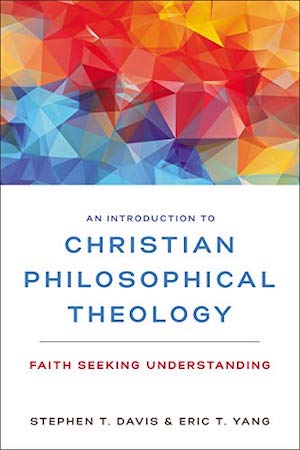Stephen T. Davis and Eric T. Yang wrote An Introduction to Christian Philosophical Theology as a textbook for undergraduate and graduate courses, but they hope it will benefit readers outside academia too. As a Christian minister, I share their hope, because I see the book’s usefulness to pastors, who have the responsibility to explain and defend theological doctrines to their church members and nonreligious neighbors alike. It is to my fellow ministers that I recommend this book.
As the Davis and Yang explain it, philosophical theology “attempts to use the methodologies and conceptual resources of philosophers and apply them to theological issues.” Some pastors may think that using philosophy is either unnecessary or prohibited. Unnecessary because the Bible is sufficient to determine doctrine. Prohibited because, as Colossians 2:8 puts it, “See to it that no one takes you captive through hollow and deceptive philosophy, which depends on human tradition and the elemental spiritual forces of this world rather than on Christ.”
Such pastoral reservations are understandable, but misguided. What the Bible warns against is not philosophy per se, but anti-Christian philosophy. Church history shows that theologians throughout the centuries have used philosophical concepts to explain and defend Christian doctrine since the beginning. Even John Wesley—the great English revivalist—recognized the importance of philosophy. In “An Address to the Clergy,” he asked, “Do I understand metaphysics; if not the depths of the Schoolmen, the subtleties of Scotus or Aquinas, yet the first rudiments, the general principles, of that useful science?”
Davis and Yang apply that “useful science” to six theological topics in this book:
- Revelation and Scripture (chapter 2)
- The Trinity (chapter 3)
- The Incarnation (chapter 4)
- Atonement (chapter 5)
- Resurrection and Life after Death (chapter 6)
- Heaven and Hell (chapter 7)
In each chapter, they identify the basic philosophical problems involved and outline potential philosophical solutions to those problems.
Throughout these chapters, the authors follow the motto, “Faith seeking understanding.” They “fully embrace the core tenets of traditional Christianity.” (However, they also note that “once we start thinking about and reflecting on what we believe, a whole host of questions arise.” For example, how can God be both one and three (Trinity)? How can Christ be one person with two natures (Incarnation)? “Though we will never fully understand the mystery of God and his ways,” the authors write, “we want to know as much as we can, just as lovers want to know as much as they can about their beloved.”
As befits an introductory text, the authors outline the current state of the question regarding each doctrine they address. That is to say, they define how different Christian philosophers explain the coherence of a given doctrine, showing the strengths and weaknesses of each explanation. The authors identify their preferred explanation on occasion, but their presentation of others’ views is fair-minded. Each chapter ends with a section titled “Further Readings,” a bibliography for readers who want to study a theological topic in greater depth and complexity.
Book Reviewed
Stephen T. Davis and Eric T. Yang, An introduction to Christian Philosophical Theology: Faith Seeking Understanding(Grand Rapids, MI: Zondervan Academic, 2020).
P.S. If you liked my review, please click “Helpful” on my Amazon review page.

